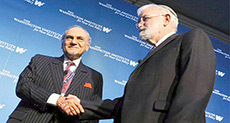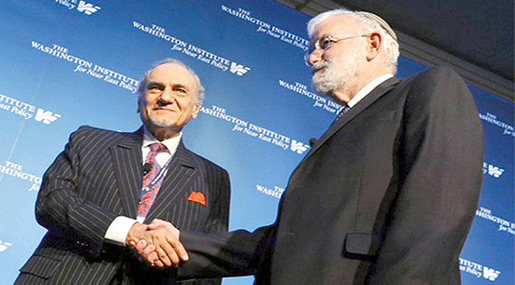Turki al-Faisal: Saudi Arabia’s Pawn in «Israel»

Once again, Turki al-Faisal, presents himself as the one representing the first convergence point between Riyadh and Tel Aviv. His remarks during the «People's Mojahedin» Conference in Paris gave further evidence of that.

Saudi Prince Turki al-Faisal's biography offers ways to understand the normalization of Saudi Arabia's relations with "Israel".
The brother of the late Foreign Minister, Saud al-Faisal, is considered one of the most prominent Saudi officials. In 1973, he worked as a consultant at the Royal Court, before being selected after four years to preside over the [Saudi] General Intelligence (the infancy stage of Saudi Arabia's participation in supporting extremists in Afghanistan and other countries, inline with US policy during the cold war). This was a position, which he occupied until 2001. During the past decade, al-Faisal was Saudi Arabia's ambassador to the United Kingdom, before succeeding Prince Bandar bin Sultan in 2005 as the head of the Saudi mission in Washington, for about two years.
In recent years, al-Faisal emerged as on of the most prominent Saudi figures to meet and converse with the "Israelis". In 2014, he sent a message to the «‘Israel' Peace Conference» held in Tel Aviv, in which he said: «Imagine that I can ride a plane from Riyadh and fly directly to al-Quds, and from there take a taxi to visit the Dome of the Rock, and then visit the tomb of Abraham in al-Khalil, and then come back to Bethlehem to visit the Church of Nativity, and then to the Holocaust Museum». He added: «What a thrill it would be not only to invite the Palestinians, but the "Israelis" who I will also meet to come to visit me in Riyadh, where they can walk around in the house of my fathers in Diriyah, where the sufferings it endured by Ibrahim Basha's conquering resembles that of al-Quds in the hands of Nebuchadnezzar and the Romans»!
In the same year, a conversation between him and the so-called "Israeli" Justice Minister Tzipi Livni took place during the Munich Security Conference sessions. At the time, Livni was sitting beside Saeb Erekat as she talked about the resolution to the "Israeli"-Palestinian conflict saying «resolving the conflict between the Palestinian and the "Israeli" sides can only come on the basis of two states for two peoples, the ‘Jewish state' and the Palestinian state». Turki al-Faisal headed towards her and praised her. She then responded saying: «I wish you could sit down with me on the podium and talk about it». During that conference, too, Faisal sometimes sat beside the former "Israeli" War Minister Ehud Barak. In 2010, the conference was a suitable event for a handshake described as «hot» between Faisal and "Israeli" Deputy Foreign Minister Danny Ayalon.
The year 2014 also saw a direct dialogue in Brussels between Turki al-Faisal and the former head of the Division of "Israeli" military intelligence, Major General Amos Yadlin. At that time Faisal said: «there is a significant development in the Arab attitudes towards ‘Israel' ».
Perhaps one of the most prominent public meetings that took place between Turki al-Faisal and "Israeli" officials, was the one that brought him together with a retired Major General and former security adviser to Prime Minister Benjamin Netanyahu, Gen. Jacob Amidror, in May of last year. Both officials met under the roof of «dialogue» hosted by the «Washington Institute for the Near East Policy» in which the Executive Director of the Institute, Robert Satloff, stated that: «we succeeded in setting the agenda for a long phase of the Saudi-Israeli negotiations that will come in the future».
On the other hand, it is likely that the coming years will reveal his probable role in including Saudi Arabia in the Camp David Accords due to Riyadh's control over the two Egyptian islands of Tiran and Sanafir. The inclusion would fall inline with his visions for the future of Riyadh's relations with "Israel". During the «Washington dialogue», Turki al-Faisal could only answer, jokingly, to a question over the two islands and the entry of Riyadh into «Camp David»: «it is better to be an observer not a participant in the agreement».
Perhaps the participation of the Saudi Prince at the Paris meeting, the day before yesterday, falls within the framework of redefining the Saudi role towards Iran in the post-nuclear agreement era, where Riyadh is one of the critics over the shift in US policy. He said during the recent visit of President Barack Obama to Riyadh: «the good old days between the Kingdom and the United States have concluded irreversibly». In recent months, the overlapping of the Saudi vision, the US role and "Israeli" diplomacy became increasingly evident.
It could be argued that the intersection of the agendas of the two parties is evident once again, to the point that the «People's Mojahedin» is accused of collaboration with the "Israeli" intelligence to carry out assassination operations targeting Iranian nuclear scientists. For instance, one of the agents who was arrested in Lebanon (in 2009) was recruited by the «People's Mojahedin» to work for the "Israeli" intelligence.
Overall, whether Turki al-Faisal has a formal role in the rapprochement between Riyadh and Tel Aviv or not, his experiences and qualities qualify him to play a regional role that serves the interests of Saudi diplomacy, without the need for Riyadh to officially acknowledge his role.
Source: al-Akhbar, Translated and Edited by website team
Comments




